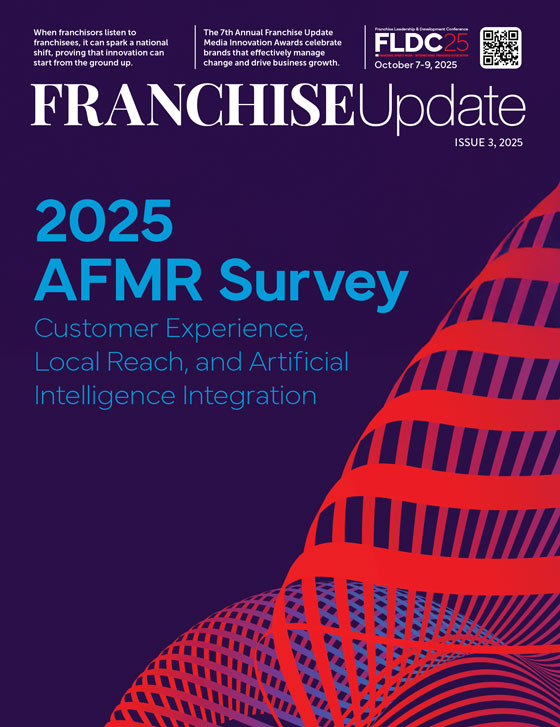Adapt Without Compromise: When Franchises Reinvent Themselves Abroad

Franchising internationally isn’t just about exporting a proven concept; it’s about transforming that concept for a different world while maintaining brand integrity. Brands that thrive overseas make smart, respectful changes without compromising their identity.
After decades of helping more than 40 franchises expand globally, I’ve seen one key truth play out time and again: The more thoughtfully you adapt, the more successfully you scale in other countries. Here are some standout examples of brands that didn’t just adjust; they reinvented themselves for success in a new culture while maintaining brand integrity. These are the bold, well-thought-out moves that paid off.
Food and beverage
- Carl’s Jr., Mexico. Carl’s Jr’s strong local franchise partners know that Mexican consumers are extremely family oriented. Playgrounds and spacious dine-in environments have been built along with newer inline and food court locations. This, combined with Mexican-inspired ingredients, a premium burger experience, and much more service than typical QSR players, helps distinguish the brand as a bold, crave-worthy char-grilled burger destination.
- Denny’s, Honduras. In Central America, Denny’s is less about late-night diners and more about all-day family meals. Locations are larger with playgrounds and private dining rooms to attract groups. The brand invested in delivery services and local menu options, helping it thrive in a high-competition, high-volume environment.
- KFC, Japan. What started as an American fried chicken chain is now part of a national holiday in Japan. KFC became a Christmas staple through years of localized advertising, emphasizing tradition, family, and celebration. Their holiday meal buckets, available only in December, drive enormous demand and require preorders. This powerful cultural pivot gave KFC a unique status in Japan’s festive landscape.
- McDonald’s, France. In France, McDonald’s reinvented the experience with sleek interiors, local ingredients, and premium offerings. Gone are the bright plastic tables. They’re replaced with wood finishes and espresso machines. The company also adjusted its sourcing practices to feature 100% French beef. These moves gave it credibility in one of the world’s most demanding food cultures.
- PJ’s Coffee, Vietnam. In a market flooded with international and local coffee chains, PJ’s Coffee succeeded by aligning with Vietnam’s preference for sit-down cafés. They introduced smaller, iced coffee beverages, including Vietnamese-style brews, and marketed freshness with daily roasted beans. The experience blends the brand’s New Orleans roots with Vietnam’s café culture.
- Randy’s Donuts, South Korea. This iconic California brand made a big impression by turning its takeout model into an “Instagrammable” café experience. Randy’s Donuts stores in Korea are larger, have ample seating, and serve locally inspired flavors like black sesame and green tea as well as Korean rice cake flavor pastries. Their colorful designs and digital-savvy promotions captured Korea’s café-centric audience.
- Taco Bell, India. To succeed in a market with a predominantly vegetarian population and diverse regional palates, Taco Bell overhauled its menu to include paneer-based offerings, vegetarian tacos, and spicy chutney sauces. Beef was removed entirely. The stores resemble upscale casual dining spaces, a departure from the U.S. fast-food look.
Non-food
- 7-Eleven, Japan. Far beyond a convenience store, 7-Eleven in Japan is a daily necessity. Stores offer ready-to-eat meals, bill pay, postal services, and even ATMs. Strategic store placement, immaculate cleanliness, and curated inventory helped turn the chain into one of Japan’s most respected retail brands.
- Chem-Dry, Australia. Chem-Dry differentiated itself with eco-friendly, allergy-safe cleaning services. Australian marketing emphasizes child and pet safety, positioning the brand as a responsible, family-first choice.
- Curves, Japan. Curves focused on older women seeking a comfortable space to begin fitness routines. The brand emphasized safety, empowerment, and support, which are critical themes in Japanese society, where aging populations value preventative wellness.
- Great Clips, Canada. Great Clips kept its core promise (affordable, convenient haircuts) but emphasized local community engagement. With bilingual messaging and support for Canadian charities, it earned trust and built a strong neighborhood presence.
- Home Instead, United Kingdom. The brand localized its model by emphasizing relationship-centered care. With more demand for aging-in-place services, Home Instead focused on matching caregivers with families and building long-term bonds. They emphasized trust and personal connections in a culture with high expectations for senior care.
- Jetts Fitness, Thailand. Unlike its mid-sized gyms elsewhere, Jetts Fitness in Thailand built more than 50 large-format gyms with premium amenities. Their marketing taps into social media and influencer culture, and flexible memberships and 24/7 access have helped it lead in a highly competitive fitness market.
- Kidzania, Mexico and the Middle East. In Saudi Arabia and the UAE, role-play zones include culturally relevant jobs like falconers or souq managers, and activities are adjusted for gender norms. In Mexico, brands like Pemex and Bimbo are integrated to reflect local business and civic life, deepening the educational and cultural value of the experience.
- Kumon, Brazil. Kumon adapted its materials into Portuguese and realigned its marketing to speak directly to Brazilian parents’ desire for long-term academic results. Their focus on self-learning and university success resonates with Brazil’s large middle class.
- The Learning Experience, China. In a country where early childhood education is highly competitive, The Learning Experience stood out by offering bilingual curriculum and U.S.-style cognitive development programs tailored for local families.
- Mathnasium, Saudi Arabia. To meet cultural and educational norms, Mathnasium operates gender-segregated centers and teaches in both Arabic and English. Parents see math as a gateway to professional success, and the brand’s messaging emphasizes long-term academic outcomes.
- The UPS Store, Canada. Known primarily as a shipping center in the U.S., The UPS Store in Canada also positions itself as a resource hub for entrepreneurs. Offering bilingual services and localized business tools, it appeals to Canada’s vibrant small-business community.
- Wall Street English, Vietnam. This global English language school chain adapted to Vietnam’s rising middle class by incorporating IELTS prep and career-linked learning into its core curriculum, recognizing the market’s job mobility and international study goals.
Respect brand integrity
Adapting U.S. franchise brands for international markets is vital due to differences in culture, preferences, and expectations. But adaptation must preserve brand integrity, maintaining the core identity and customer promise. Successful global franchises localize menus, messaging, and operations to fit local norms while staying true to what makes the brand recognizable. This balance builds trust, relevance, and long-term success. In international franchising, adapting with intention without losing the brand’s essence is essential for sustainable growth.
The brands featured here didn’t just localize; they adapted intelligently and respectfully. They remained true to their DNA while showing local audiences that they understood their needs. That’s the key: adaptation rooted in identity. When global expansion begins with listening and evolves with purpose, franchises can thrive far beyond their home market.
Five Key Takeaways from Brands That Went Big Globally:
- Change the space. Layout, lighting, and flow matter as much as the product.
- Culture counts. Connect to local rituals, not just global trends.
- One size rarely fits all. Tailor your format and service model to local needs.
- Messaging must resonate. Translate values, not just words.
- Let locals lead. They know what works on the ground.
William (Bill) Edwards, CFE, is the CEO of Edwards Global Services (EGS) and a global advisor to international businesses. With five decades of experience, Bill has helped more than 40 companies expand internationally. Contact Bill at +1 949 375 1896 or [email protected].
Share this Feature
Recommended Reading:
| ADVERTISE | SPONSORED CONTENT |
FRANCHISE TOPICS
- Multi-Unit Franchising
- Get Started in Franchising
- Franchise Growth
- Franchise Operations
- Open New Units
- Franchise Leadership
- Franchise Marketing
- Technology
- Franchise Law
- Franchise Awards
- Franchise Rankings
- Franchise Trends
- Franchise Development
- Featured Franchise Stories
FEATURED IN

Franchise Update Magazine: Issue 3, 2025
| ADVERTISE | SPONSORED CONTENT |








 The franchise listed above are not related to or endorsed by Franchise Update or Franchise Update Media Group. We are not engaged in, supporting, or endorsing any specific franchise, business opportunity, company or individual. No statement in this site is to be construed as a recommendation. We encourage prospective franchise buyers to perform extensive due diligence when considering a franchise opportunity.
The franchise listed above are not related to or endorsed by Franchise Update or Franchise Update Media Group. We are not engaged in, supporting, or endorsing any specific franchise, business opportunity, company or individual. No statement in this site is to be construed as a recommendation. We encourage prospective franchise buyers to perform extensive due diligence when considering a franchise opportunity.